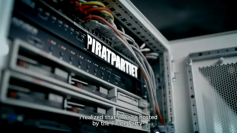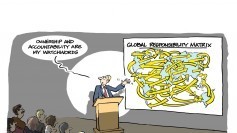Rick Falkvinge's Blog, page 29
February 7, 2013
Court Of Human Rights: Convictions For File-Sharing Violate Human Rights

Civil Liberties: The European Court of Human Rights has declared that the copyright monopoly stands in direct conflict with fundamental Human Rights, as defined in the European Union and elsewhere. This means that as of today, nobody sharing culture in the EU may be convicted just for breaking the copyright monopoly law; the bar for convicting was raised considerably. This can be expected to have far-reaching implications, not just judicially, but in confirming that the copyright monopoly stands at odds with human rights.
The European Court of Human Rights in Strasbourg is no dismissible small player. It is the court that oversees the European Convention on Human Rights (ECHR), which is part of the Constitution of the European Union and of most European states. When this court makes a decision, that decision gets constitutional status in all of Europe (except for Belarus, which is not a signatory).
Therefore, the copyright monopoly as such – which is ordinary law in European states – was just defined as taking a back seat to the constitutional right to share and seek culture and knowledge, as defined in the European Convention on Human Rights, article 10:
“Everyone has the right to freedom of expression. This right shall include freedom to hold opinions and to receive and impart information and ideas without interference by public authority and regardless of frontiers.” (ECHR 10)
We have long claimed that the copyright monopoly stands in direct conflict with civil liberties (one of my most well-known keynotes, Copyright regime vs. civil liberties, even highlights this in the title). While the judiciary is slow to react to new phenomena, and issues like this percolate very slowly to the top courts where verdicts make a real difference, I’m very happy to see that the issue did indeed get to the relevant court at last, and that the Court made the only reasonable decision.
However, this verdict doesn’t mean that people sharing culture can never be convicted. Exceptions can be made to Human Rights according to a well-defined three-step test: the verdict must be necessary in a democratic society, prescribed by law (the copyright monopoly already is), and pursuing a legitimate aim (this can be discussed at length).
This means that people can no longer get convicted for violating the copyright monopoly alone. The court just declared it illegal for any court in Europe to convict somebody for breaking the copyright monopoly law when sharing culture, only on the merits of breaking the law. A court that tries somebody for violating the copyright monopoly must now also show that a conviction is necessary to defend democracy itself in order to convict. This is a considerably higher bar to meet.
I am happy to see that people persecuted for sharing culture and knowledge all over Europe got this quite strong judicial decision in their back. I’d love to see the copyright industry lobby try to make a case why it is necessary to defend democracy to convict a single mother of three who shared pop songs.
The summary in English of the French verdict is well worth reading (with my highlights):
For the first time in a judgment on the merits, the European Court of Human Rights has clarified that a conviction based on copyright law for illegally reproducing or publicly communicating copyright protected material can be regarded as an interference with the right of freedom of expression and information under Article 10 of the European Convention. Such interference must be in accordance with the three conditions enshrined in the second paragraph of Article 10 of the Convention. This means that a conviction or any other judicial decision based on copyright law, restricting a person’s or an organisation’s freedom of expression, must be pertinently motivated as being necessary in a democratic society, apart from being prescribed by law and pursuing a legitimate aim.
It is, in other words, no longer sufficient to justify a sanction or any other judicial order restricting one’s artistic or journalistic freedom of expression on the basis that a copyright law provision has been infringed. Neither is it sufficient to consider that the unauthorised use, reproduction or public communication of a work cannot rely on one of the narrowly interpreted exceptions in the copyright law itself, including the application of the so-called three-step test [...]
Via Glyn Moody.
UPDATE: Be careful interpreting this verdict as a free-for-all. It’s not. What it says is that violating the copyright monopoly laws is not enough for a conviction, and that the copyright monopoly laws collide with Human Rights. Those are two huge wins in themselves. But it doesn’t mean nobody will ever get convicted for sharing culture again – just that courts have to justify why a conviction is also “necessary in a democratic society”, in addition to having met the normal and previous bar for a conviction.
It will take years to flesh out precedents with this wide a margin for interpretation, and the specific action on trial as well as its intent will be under close scrutiny for its value to democracy as such – record label lawyers will justify a conviction with circular reasoning (“upholding the law is necessary in a democracy, so the prerequisites are already met”) and human rights lawyers will probably strike down any conviction (“human rights trump all”). So while this verdict gave two important victories, it’s not the end of the conflict nor the end of the war.

February 3, 2013
Let’s Play Taboo When Discussing Politics

Reflections – Zacqary Adam Green: Let’s play a game: get a friend to guess the word “baseball” without saying “game,” “sport,” “pitcher,” “catcher,” or “batter.” That means you have to think pretty creatively about baseball, right? This is how the party game Taboo works. What if we played Taboo when discussing political issues?
For example, let’s talk about how to lower unemployment. The taboo words are:
Job
Economy
Company
Private Sector
Money
Unemployment
We’re also banning synonyms of these words. No cheating and saying “currency” instead of “money,” or referring to a “company” as a “corporation” or an “employer.” The point of this exercise is to get yourself thinking in a different way. In order to even have this discussion, we have to answer the question: what is employment? What’s a job? What are they for?
Here’s another one: what powers should the government have over people? Discuss this without saying “government,” “law,” “regulations,” “rules,” or “rights.”
How can we stop crime? You can’t say “crime.”
The language that we use to talk about the issues that we face — as a culture, as a society, as a species — has profound effects on the way that we think about, well, everything. Perhaps by forcing ourselves to come up with a new way of describing the world in which we live, we’ll discover (or rediscover) a new perspective, a new insight, or a new philosophy that can help us make it a better place.
What other political issues would you like to play Taboo with? Sound off in the comments.

January 31, 2013
Routine Dismissive Agreements To Terms Of Service Are A Real Problem (Poll Inside)

Infopolicy: The habit for companies to write terms of service to a length and complexity nobody can understand, coupled with the subsequent habit of everybody of agreeing to them without reading them, has become a real problem. It undermines the concept of contracts as such, and it enables corporations to undermine citizens’ rights without democratic oversight. Maybe regulation is needed.
People are agreeing to anything with a “yeah, whatever” shrug today. A particular website’s terms of service may well include signing away their entire inheritance and house, and it’s likely nobody would notice. This is a real problem, as our ancestors fought hard to give us the rights we have today – rights that are routinely signed away just to play the latest game.
But it’s more complex than that. By a collective mounting of insurmountable obstacles from the entire corporate world to do anything today, we have become desensitized to the concept of a contract. Normally, this was something you’d read, consider, possibly consult with a lawyer, and then sign. But when faced with several of these a week in your daily personal life, doing so would absorb all your waking time.
So we do what humans do. We take shortcuts and cut corners. “Yeah, sure, whatever.”
In a poll whether people usually read the Terms of Service for a website or software before clicking “I agree”, 76% responded “No”. The rest clicked on “I agree”. Yes, really – this actually happened:

Actual poll results. You couldn’t make it up.
This problem is twofold. The immediate danger is that citizens are giving away all the rights they would normally have under law, establishing a new baseline of no rights at all that will become the law as the next generation grows up seeing it as the norm. The second problem is that corporations see themselves as needing all of these – excuse the French – bullshit contracts just to show you a simple cartoon.
Since when did we need to sign terms in blood just to go about our daily lives? Where did this come from? I’d sum the reason up to three words: lawyers, litigation, and liability.
Our society has degenerated into a cover-your-ass society where nobody is prepared to take the action you ask for, another action than the one you ask for, or no action at all unless you guarantee you’re not going to destroy their life over it. It’s essentially a world paralyzed by fear.
In this world, it makes perfect sense for corporations to spend hundreds of thousands of euros to perfect contracts with their everyday customers. (You didn’t think corporations wanted to spend money writing that crap and harassing customers with it, did you? Heck, they’d much rather spend that money on champagne at an executive retreat than give it to lawyers for making customers unhappy.)
So routine dismissive agreements to contract isn’t just one problem, the one of a slippery slope where people sign away rights. It’s at least two problems, where the second being how money is being siphoned off the economy to write the crap in the first place, caused by fear of litigation.
This may actually be an area where regulation is beneficial for everybody but the lawyers.
By establishing clear legislative lines of where corporations are liable and not (in a way that contracts cannot override it), and establishing clear rights for citizens against corporations – do not dare say consumers, these are citizens’ rights – that are equally inviolable, you can get rid of much of the need for these contracts in the first place. Nobody really wants them.
The danger in doing so would lie in regulatory capture – that is, that the balance between citizens’ rights and corporate liability is struck at a point where those with money would like it to be – and that you’d make it harder for future, unthought-of businesses, pretty much like the copyright monopoly is making life hell for everybody except the obsolete middlemen right now.
But wouldn’t that be better than people unknowingly signing away their firstborn sons because they’ve learned to not read contracts?

January 29, 2013
TPB AFK: How The Pirate Bay Is Legally Shielded By The Pirate Party

Activism: A new teaser trailer for the upcoming movie TPB AFK – The Pirate Bay, Away From Keyboard – was just released. In the teaser, Peter “Brokep” Sunde describes the cat-and-mouse game between the legal side and technical side, and the rationale for using the Pirate Party as ISP. From our side in the Pirate Party, this was a very interesting and politically provocative (i.e. good) move.
The trailer describes the steps leading up to when the Swedish Pirate Party became the Internet Service Provider for The Pirate Bay, something that is still the case. (You can verify this by doing a traceroute to The Pirate Bay – the last visible host in the chain should still be thepiratebay.piratpartiet.se, as it was in 2010.)
We actually went a step further, and also promised to host The Pirate Bay from the inside of parliament if elected, using the constitutional parliamentary immunity for political activity in parliament. Since we had stated that promise as an election promise (widely covered in ), it would meet all requirements for being political activity, and therefore constitutionally protected.
Teaser trailer:

January 28, 2013
Cameron’s Speech Opens A Window Of Opportunity To Reform The EU

Transparency – Christian Engström: As a member of the European Parliament for the Swedish Pirate Party, I was very happy to hear British prime minister David Cameron announce that Britain will have a referendum on its EU membership, probably some time around 2017. This is excellent news.
In practice, this means that Cameron has told the EU that it has until 2017 to shape up and get its act together, if they want to keep Britain as a member.
If the referendum was held today, with the EU in the shape it is, the UK citizens would almost certainly say no to remaining members. If the EU wants to avoid falling apart with Britain leading the way towards general EU disintegration, the EU must quickly reform itself into something that has a chance of being attractive to the citizens, including those in the UK.
This opens a window of opportunity to reform the EU in the direction that we in the Swedish Pirate Party are demanding in our political platform. We want a transparent and democratic EU that only does the things that the citizens and member states agree need to be done on the European level, instead of trying to meddle with everything.
The EU today suffers from a lack of both transparency and democratic accountability. The important decisions are taken by lobbyists and unelected civil servants behind closed doors.
The ACTA negotiations were a perfect example of this lack of transparency, but most issues handle by the EU follow a similar pattern. The IPRED directive, longer copyright terms for musical recordings, data retention, and various EU Commission initiatives for either three-strikes or internet censorship or both.
Most of the things that we Pirates are fighting against in our daily political work come from Brussels and the EU. This is no coincidence.
All the new laws that pamper to various rich and influential special interests at the expense of ordinary citizens are the result of this structural problem in the EU. In Brussels, the industry interests represented by various lobbyists almost always carry more weight than the interest of ordinary citizens.
We Pirates should and will continue to work for more transparency within the current framework, but this will not be enough to solve the fundamental problems with EU.
The Lisbon Treaty was rammed down the throats of the citizens, against their will and despite clear no votes in several referendums. The EU elite got it through in the end, but it should be obvious to everybody that it’s the end of the road when it comes to pushing ahead towards superstate against the will of the people.
We need a new basic treaty for the EU to replace the undemocratic Lisbon Treaty, and the mess of other treaties that serve as the EU’s legal basis today. And this time it shouldn’t be a Treaty drafted by the elite behind closed doors and then presented on a ”take it or take it” basis to the citizens. This time it must be a treaty that the majority of citizens in Europe are prepared to support in a Europe-wide referendum.
In an interview with the Pirate Times, UK Pirate Party leader Loz Kaye describes the UK Pirate Party’s views on the EU:
I think it’s fair to say many of our members have quite an internationalist outlook. Like any UK party (perhaps apart from UKIP!) there are a range of views, and of course we encourage debate. Even so, our crowd sourced manifesto which was overwhelmingly adopoted by our members is clear. Our vision for the EU is based on our fundamental principles.
It’s important that the EU increase its level of transparency and openness, and this should inform the EU’s politics, organisation and administration. The union should be accountable to its members and citizens, the Council should be properly open to scrutiny by national parliaments, and there should be a fundamental rebalance to elected representatives.
This is very similar to what the Swedish Pirate Party is saying from our perspective. We want to see an EU that is based on transparency and openness and is accountable to its citizens. This would be a very different EU from the one we have today, so a new basic Treaty is needed.
Thanks to Mr. Cameron’s decision to let UK citizens have their say about the EU in 2017, there is now a real possibility that we can build the political momentum to get a new EU Treaty that puts the EU under democratic control by the citizens.
This is an opportunity that we must seize.

Operation Last Resort

Civil Liberties – Travis McCrea: Anyone who read my last post knows that the death of Aaron was hard on me, as it was to many in the Pirate community. Today the war for the Internet and civil liberties has developed into a new battle in Op: Last Resort.
A group of Anonymous members hacked the Sentencing Commission website (apparently more than once), and when they did they were able to collect information that is presumably embarrassing to the US Federal Government.
“Two weeks ago today, a line was crossed,” says the video released by the Anons. “Two weeks ago today, Aaron Swartz was killed. Killed because he faced an impossible choice. Killed because he was forced into playing a game he could not win — a twisted and distorted perversion of justice — a game where the only winning move was not to play.”
Usually I would support these actions passively and go about my business, but as I have posted before, there are times for actions. We have the Pirate Party which fights to change things on the long term, but there must be those of us who act out side of the party who do bigger things to create change by force. We don’t walk down the street and watch someone kick a puppy and then loby for legislative change to stop it… we take direct action to intervine. The general public is ignorant and willfully so, and so there must be those of us who take action which might upset some people because we are acting with direct (non-violent) force to stop an injustice.
My fork of the Kopimist Church with funding from The Ultimate Ebook Library have launched a website to make it easy to share links to download the files, you can find it here. I wish there was more that I can do to take direct action, but for now this will have to do. I encourage other people to take the actions that are needed to impede commerce for those who support oppression and to free information hidden from us by our governments.

When Pirate Comradeship Beats Old Grudges

Argentina – Juan Manuel Santos: On December 18th, 2012, the UK’s Pirate Party proxy to The Pirate Bay was shut down. In resonance with the Internet’s spirit, two more, belonging to Pirate Parties, sprang up: one from Luxembourg and one from Argentina. With that last one, I saw thirty years of government propaganda be pulverized in a split second.
For three decades now, relations between Argentina and the United Kingdom have been edgy, to say the least. Pointless sovereignty fights live on until today, but what if pirate comradeship could change all that?
On April 2nd, 1982, the Argentinian military government (dictatorship) invaded the Falklands/Malvinas Islands. I am certainly not going to bore you, reader, with the historical details. Suffice to say that it was a political move from the Argentinian government to try and regain at least some of its lost popularity with the public. Most Argies and Brits who have done some research on the subject know this. Neither am I going to bore you with historical reasons tilting the scale in favor of one country or the other, because after doing some research of my own on the subject, I could get to no distinct and unequivocal conclusion regarding the sovereignity of an archipelago which is, even from here in Buenos Aires, mind-boggingly far away.
War is horrible. My respect and admiration go out to the soldiers, and the families of the soldiers who got dragged into this pointless war (on both sides), which in the end was nothing more that a stupid power game. There’s nothing more I can say on the subject (and the previous words were written only as historical background), so let’s move to a more constructive argument: what if pirate comradeship could erase the grudges that stupid wars create?
In April 2012, when censoring The Pirate Bay was gaining momentum, the UK Pirate Party released to the public a proxy for those people who had been left out of the most efficient public library in the world. For a time, everything was business as usual. Sadly, BPI started pushing PPUK and, following formal notifications to PPUK individuals from the BPI’s solicitors, the proxy was shut down on December 18th, 2012.
I felt really sad and dispirited, but that was until I got back to IRC from a 20-minute break. While I was away, a member of the Argentinian Pirate Party decided to bring up a proxy of our own, in sign of support to our Brit comrades. A day later I found out that the Pirate Party at Luxembourg had done the same. But the thing that got me thinking, is that this person who put up the Argie proxy, did it of his own will. He did not even tell the rest (at least not on our IRC channel) that he was going to do it. I think he saw it as the right thing to do and he did it. And actually, once we saw the proxy up, with all that was happening, sans a minor bandwidth consumption consideration, we all agreed it was indeed the right thing to do.
I saw thirty years of educational messages and government propaganda be pulverized in a split second, so as to make room for something much bigger, more important and, ultimately, more humane: sharing, comradeship, collaboration. I believe this is (part of) what being a Pirate stands for. And I am happy to be part of this movement. I believe that, in time, the Pirate Movement can finally put an end to wars like this, and pointless statements like this one or this one.

January 26, 2013
Freedom Of Speech Is Primarily The Right For Stupid People To Say Dumb Things (And That’s A GOOD Thing)

Infopolicy: Yesterday, a French court decided that people on Twitter have no right to anonymity when posting xenophobic comments. This is deeply troubling: the court says that unpopular opinions don’t have the same protection from freedom of speech as popular ones. Further, and more troubling still, this is a pan-European trend.
The verdict yesterday attempts to force Twitter to hand over the identities of people who made racist and stupid remarks on Twitter. (Whether a French court has jurisdiction over Twitter is another matter.)
It is not disputed that the anti-Semitic remarks in question are easily regarded as plainly disgusting in the eyes of most people: they certainly are. But banning those political opinions is not learning from history: it is repeating the gravest mistakes of history and walking in its dire footsteps.
You never needed a constitution to protect popular people’s right to express popular opinions. When they say dumb things, nobody really minds, either. When stupid people express popular opinions, nobody objects, so no problem. Freedom of Speech exists specifically to protect despicable people who are uttering intolerable opinions, and that’s a vital protection.
As a precondition for functioning freedom of speech, anonymity has always been an important layer of protection for unpopular opinions. Opinions which has always been possible to say in the streets as a means of shaping public opinion, well, those opinions is no longer possible to say without risk of repercussion. That’s a very dangerous development.
Some people would argue that what you can’t say in the streets, you can’t say online. But this argument is a contradiction in terms: the argument is actually pushing for considerably less freedom of speech online. What we have is a situation where somebody said something dumb and irresponsible online, and was punished by having their anonymity broken. The offline equivalent would be that anybody could be required to produce a photo ID in the streets when they said something that somebody else didn’t like, and so, could be required to produce photo ID at any time. It is the equivalent of a papiere, bitte society.
You could easily observe how important anonymity is for awful, even seriously criminal, opinions. To take a high-profile example, the famous pamphlets arguing for the independence of the then-British colonies in North America were published anonymously. This was high treason against the British Crown, and not punishable by a fine, but by torturous death. If anonymity had not been possible at the time, the United States of America would not exist today.
Anonymity is a vital layer of protection for advancing society by challenging dogma through publishing opinions that were unpopular at the time, but turned out to be right.
Banning and punishing unpopular opinions, such as xenophobic expressions, is not learning from history. It is repeating the gravest of history’s mistakes.
We have learned in a horrible way that the antidote to trolls isn’t banning them into the caves. It has always been sunlight. The answer to threats to democracy can never, ever, be censorship, that is itself a graver threat to democracy. Rather, it must be sunlight, it must be openness. It must be more discussion, not less.
Today, there is a line where you can commit a crime by inciting another specific crime, and that might be a reasonable line to draw. But uttering political opinions, no matter how despicable or discriminatory, is still uttering political opinions.

January 24, 2013
An Open Letter To Pirated Artists

Infopolicy – Lionel Dricot: In an open letter to artists, Lionel Dricot explains his own thinking as a creator of art and writings. Mr. Dricot outlines why people in general are not prepared to pay if the money goes to middlemen, but are generally prepared to support the artists directly. The enemy is not pirates, Mr. Dricot explains – the enemy are the parasitic middlemen who have been taking 95% of the cut and are fighting to lock everybody else out.
Dear artists,
A year ago, in order to support the blackout against SOPA, I wrote a blog post explaining why I was pirating your work. A few hours later, the sudden closure of Megaupload gave an unexpected popularity to my text. In the weeks that followed, nearly 100,000 people read it on this blog, not to mention the numerous translations.
With Flattr, I earned a total of € 34.70 for that post and its French translation. If I had a 1€ paywall, this post alone would be worth € 100,000. Even considering that only 10% of readers would pay, it would still be around € 10,000. Not bad, isn’t it?
But if I charged visitors, nobody would have read that text in the first place. It would never have become viral and I would not have earned a single euro on Flattr. This seems obvious, isn’t it? It is nevertheless exactly what the entertainment industry makes you believe when they say that pirates steal. Pirates steal your art as much as readers stole mine when reading my blog post.
The fundamental error is to consider art as a commodity. Even selling MP3 or eBooks follows the principle of hardware. Buyers keep their “MP3s” as a collection of records. DRM attempts to mimic physical constraints in the virtual world.
But what is your goal as an artist? Selling records, books and paintings? Or to be read, listened to and admired? Hopefully, money put aside, you would choose the second. Discs and books are only physical mediums that allow you to broadcast your art.
Many of you can not make a living out of art. It is a sad but perfectly normal situation. Personally, I also consider myself as an artist. After all, I blog and I write fiction. I would like to make a living out of it in order to devote myself full time to writing. This is obviously not the case. Either I did not found the right business model or I don’t have enough talent. Is it the fault of people who read my blog for free? Definitely not: they spread my writings and give me sometimes small donations. Yet again, this is exactly what the industry makes you believe: that your fans are your enemies, those that prevent you from living from your talent.
You want to broadcast your art, and if possible, earn money. We want to enjoy your art, and if possible, contribute financially to your talent.
However, when we buy your art “legally”, we know that over 95% of our money goes to intermediaries. We consider most of them unnecessary and harmful to society. All the sweat, all the talent that you put in your art is vampirized at 95% by these parasites. We are also reluctant to pay the same price for a fun song that we will listen to once or twice or a hymn that will resonate for every morning of our lives.
We are ready to invest in the launch of your projects, eg on Kickstarter. But we do not want to pay to “own” a file. It does not make any sense. We do not imagine paying a fixed price each time we “consume” a piece of art. Your hardcore fans would be ruined. Not to mention those who listen to background music while working. It would be a barrier to your success. My personal solution is to give, every month, a fixed amount through Flattr. On Grooveshark, an artist is Flattred if I listened to one of his song at least once during the month. I’d like to see that kind of automatism being generalized for any content like ebooks and movies.
If we generalize such a system, your interest as an artist would become to be heard, read, admired. Even if it is years later, allowing you to focus on the long term. On the opposite, mixing a work with its physical support encourages quick consumption, aggressive marketing and ephemeral success before falling into oblivion.
In order to preserve its own obsolete interests, the entertainment industry has lied to you pretending that we were your worst enemy, they benefited from the vast majority of your earnings, they threatened your fans as criminals, they perverted our laws, our politicians and our educational system, they standardized our culture and creativity. Simple tactics: they oppose us and benefit. However, we share a common interest: that you could devote yourself to your art without having to flip burgers. While their own is to earn money, regardless of your accomplishment.
Dear artists, would you embark on a pirate ship bound for the new world where fans and artists cooperate? Everything has to be discovered yet. Flattr is anecdotal and, moreover, might be more an experiment than a solution. Same for online donations. Many problems have to be solved. This is why we need you and your creativity. But not those leeches on your back.
Hoping for a positive answer from you,
A pirate fan.
This post was first published on ploum.net.

January 23, 2013
Abandon Integrity, All Ye that Gain Power?

Activism – Andrew "K`Tetch" Norton: If we had any doubt of the reason we need to be extra vigilant in our work, this month has provided them in spades. But there is one thing that ties everything together, and that is the matter of integrity, and accountability. Through all the issues, those that take the lead are never held to account. Often, ironically, they do these acts while trying to hold others to account, in some sort of twisted egotistical irony powertrip.
I could have posted this Friday, but I didn’t. Saturday was an option too, but I wanted to wait. Above all I felt a need to slowly think about things, before acting, or saying. Many have let their emotions speak, but while they’re good for the short-term, we need a long term look.
The past week or two has been a turbulent one for many like me. The success of the one-year anniversary since SOPA/PIPA was overshadowed by the tragic (and preventable) suicide of Aaron Swartz, and the launch of Mega on the one-year anniversary of the raid (pretty much to the minute)
Then, through it all the irony of the Martin Luther King speech about freedom, being locked down. To cap it, the one man going to be imprisoned for the waterboarding, is the one who alerted the public, and not one who conducted it.
It’s a conflicting and emotional time in many ways, as many of the issues we pirates are passionate about are hitting landmark points all in a week. And overshadowing it all is Aaron, and his tragic final decision.
I was invited on a Huffington Post Live panel Friday night to discuss some of these issues. With me was Tim Lee (ArsTechnica), Trevor Timm (EFF), and Holmes Wilson (Fight for the Future). I don’t think I did that well, but judge for yourself.
It was actually quite an interesting spread too, you had the tech press, legal, activist, and me with the political aspects. I doubt they could have got a better spread if they’d wanted.
But from the talk there, and the pre-show banter, I took away one thing. We all care about this, and we all want the situation to improve. Sure we’re all young men, but we’ve looked at the situation out there, and see massive problems. We’re all intelligent and hardworking (well, those three are, I wouldn’t say that about myself, because I know it’s not true) and could easily making a shedload of money in any private concern of our choosing. Instead we choose to do this.
We’re also all worried. What happened to Aaron could have happened to any one of us. It could have happened to my kids. It was the actions of people who have become unaccountable, and who point to the system and say ‘just following it’ instead of using their brains, and integrity.
But then half a world away, you have the Dotcom saga. A year to the minute (just about) from the raid, he launched Mega. I gave the service a basic look a few days ago (luckily, before the launch, as demand has made it mostly unusable since) and while it’s not great, it’s not bad. But the launch underscored the legal battle that had gone on for a year.
It’s a very similar case to Swartz, in that there’s an excess of prosecutorial zeal, with those behind it trying to hide behind the letter of the law when under scrutiny, but openly milking things for as much publicity, to sell their side of the story otherwise. I never had the chance to know, or talk to Aaron, but I’ve a feeling we were on the same page a lot of the time, and a lot of people I know and think highly of, thought highly of him too. While this is not an adequate eulogy on his life, little will be except the kind of change he believed in. Words are just words, the real measure of someone’s life is how they changed the world. Aaron, he changed it hugely in his works, and will still continue to do so. He was a larger-than-life person, with larger than life ideals, and ones we’re going to be scrambling to aspire to.
Now, I’m not the biggest fan of Dotcom, and to be honest I can take him or leave him really. I have a number of German friends, and there was some distaste for him from them. His actions and attitudes in general had the same sort of nouveau-riche tasteless tackiness you’d expect from a Premiership footballer or a Real Housewives target.
To have taken a man that’s hard to be unsympathetic about, and give him the chance to completely turn around his public image takes a special lot of work, but the US Gov. managed it. From the overblown military assault, to the more recent revelations that the evidence the DoJ used to justify the raid was there because of… the DoJ.
Again a bunch of people working for special interests, and not for the public good, who are quick for boasting of how hard they’re working and that they’re responsible for these prosecutions when it goes well, only to retreat behind the minutiae of communications and the wording of the laws.
Then we come to SOPA/PIPA one year on. I can’t explain in words here adequately what the causes and solutions are (it’d take WAY too long). If you want that, then maybe listen to a panel on the topic I gave back in September (mp3, ogg).
One thing is certain and that is the contempt we were treated with. We had to pass these laws, we were told, or ‘else’. You know, piracy run rampage, and unchecked, companies go bankrupt because no-one buys anything, seas boil dry, the Rapture, another Rebecca Black video, and so on.
Well, the laws didn’t pass. And things didn’t go as claimed – it turned out none of the bad things happened. In fact, the movie studios had (yet another) record breaking year. Music sales were still good. Also it seemed we didn’t need those new laws to do the things in them either. It just made existing things a bit easier, with a little less accountability and a lower burden of proof.
After 15 years of passing every sordid little whim of industries that want power, but no responsibility, people finally said ‘enough’ and warned that accountability would start.
Want an example? How about Martin Luther King Jr.’s “I have a Dream” speech. It was made 50 years ago. He died 45 years ago. It’s still under copyright. No matter how much protection the speech gets, he’s not going to write any more. Yet it’s been taken down repeatedly over the past weekend.
Or the Bradley Manning trial. His military trial found this month that his pre-trial detention broke the rules. As such he’ll get 112 days off any sentence (which assumes he’ll be convicted) but those responsible will get nothing. Nada, Zip, Zilch; for actions which a criminal judge has found to be illegal, no punishment. Did they somehow forget their jobs and go too far on a whim, or is it part of an institutionalized attempt to punish those accused before being convicted?
Or we could mention the CIA and its waterboarding of detainees over the past ten years. Despite the practice being ruled illegal by US courts for centuries (and sometimes recently) it was Okayed. Despite it being against international law and treaty, and against the greater will of the people, and having no substantive value at all, it was approved and performed. And from all these lawbreakers who’s the only one to even be taken to court much less convicted? John Kiriakou, who didn’t perform the acts at all, but confirmed they were used. His crime was bringing some accountability to the government. His sentencing will take place on January 25.
Meanwhile, the man that authorised it (bush) and said it was ok, sits on a ranch in Crawford, Texas. Although his overseas trips and visibility have waned since a group vowed to have him charged with War Crimes, just before a trip to Switzerland in Feb 2011. He cancelled his trip and has had a low profile since.
Tellingly though, is the passing of the American Service-Members Protection Act, which actually prohibits the US, and any US servicemen from assisting the International Criminal Court, to the extent it permits armed action against it (without needing Congressional approval). Thus it gives rise to the informal name of The Hague Invasion Act.
And here we come again to the issue. It’s accountability every time.
EVERY SINGLE TIME
Every time, people act in a selfish or self-serving way. These are people who have a public trust. Legislators, prosecutors, law enforcement, the civil services; they’re the cause of the problem we have today. Every time they’re caught out, they claim they’re ‘just doing their job’.
“Just doing your job” is no excuse to act like vile reprehensible vogons. When you take your job serving the public, you don’t discard your humanity. You’re not stripped of any sense of perspective. You most certainly are not given a right to pursue any action you want just because you can. There is no sign over the door saying “abandon all decency ye who enter here”. The more power and influence you have, the less accountable you are.

Chart, showing accountability Against power or influence.
By K`Tetch CC-0
And yet, that’s what we now have. All these cases have one thing in common. They put the good to society – the cost of the actions as a whole – and any sense of proportion to one side, because it may help further their careers or goals.
Berman, Smith and the other SOPA/PIPA sponsors were after more campaign funds from a media industry that could be shown ‘they were on your side’. Ortiz was looking for easy headlines, so that a run for the Governor’s office might be attainable, and headlines and a reputation regardless. The DOJ wanted to have a strong don’t mess with us’, and support the media industries (where many of the top cadre of lawyers had come from, and where they presumably will return) for the Dotcom raid.
Only now are we seeing any sort of accountability, and even then there’s resistance. Ortiz has said she has done nothing wrong (TWICE). The DOJ is hiding behind technicalities in the Megaupload case, and despite being comprehensively panned by the citizens, the same sorts of things are still suggested and hinted at.
Now we have the 6 strikes scheme, which again has no sort of accountability for false claims, but acts purely on accusation. Again, no recourse for false claims, but penalties if someone makes a claim against you.
It’s absurd.
And it is all because no-one is held to task for their actions and their motives.
It’s sickening, and it’s time we put a stop to it, once and for all.
Things are now starting to change, but slowly. We all need to get behind it and work hard to make the changes that happen; to push for what is right, not just for us, or for our employer, but for our society, and our future.
Start telling the truth. Tell people when they’re wrong, correct them and point them towards resources so they don’t make the same mistakes again. Hound your lawmakers, and let them know that governance without accountability is tyranny. Most importantly, ask questions and DEMAND answers, REAL answers, based on evidence, citing sources.
It’s only when we as people can start embracing truth, and accepting responsibility, can we move on once again as a civilization.

Rick Falkvinge's Blog
- Rick Falkvinge's profile
- 17 followers



